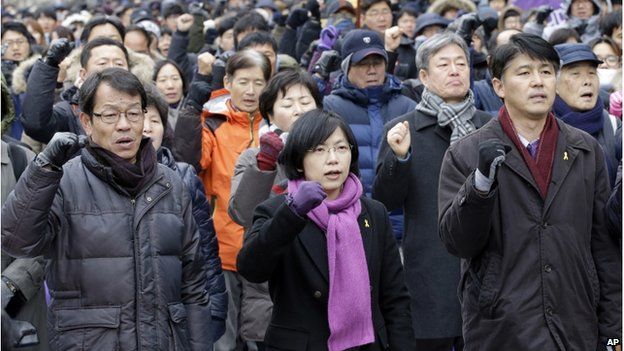South Korea court bans 'pro-North' political party
-
Published

South Korea has banned a political party for the first time in decades, with a court ordering a party accused of supporting the North to disband.
The government had petitioned the constitutional court last year to ban the leftist Unified Progressive Party, which has five members in parliament.
Some UPP members were previously arrested for plotting a rebellion.
The move has sparked concern about freedom of expression and association in South Korea.
The decision was closely watched by political groups, with hundreds gathered near the constitutional court in Seoul amid a tight security presence of about 1,000 riot police.
Both UPP supporters and its opponents held demonstrations, shouting slogans and waving signs, reports said.
It is the first time South Korea's constitutional court has banned a political party since it was established in 1988, said AP news agency.
Eight out of nine judges agreed on Friday to accept the government's petition to disband the UPP, order it to forfeit its seats in parliament and ban an equivalent party from forming.
Chief Judge Park Han-chul said "there was an urgent need to remove the threat posed by the party to the basic order of democracy".
Ban 'raises questions'
Justice Minister Hwan Kyo-ahn, making the government's final argument before the court last month, said the UPP has attempted to "establish a pro-communist government and unification to realise North Korean-style socialism".
But the UPP has said it only wants greater reconciliation with the North.
The government's petition was prompted by the arrest of several UPP members in 2013.
Seven members were eventually convicted of plotting to overthrow the South Korean government in the event war broke out with the North.
UPP's leader Lee Jung-hee told reporters on Friday that the decision "opened a dark age with an authoritarian decision" and had turned South Korea into a "dictatorial country".
Amnesty International's East Asia research director Roseann Rife said the ban "raises serious questions as to the authorities' commitment to freedom of expression and association."
"Security concerns must never be used as an excuse to deny people the right to express different political views," she said.
-
-
Published19 July 2023
-